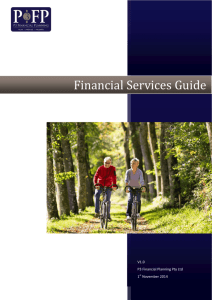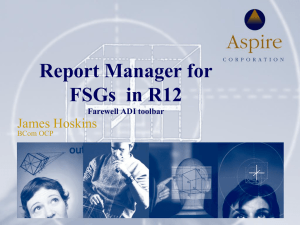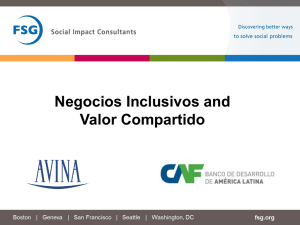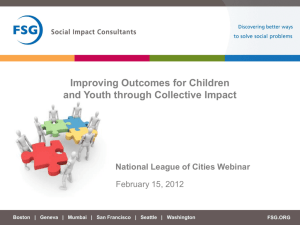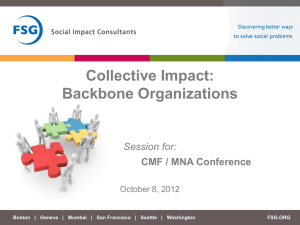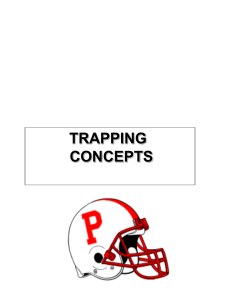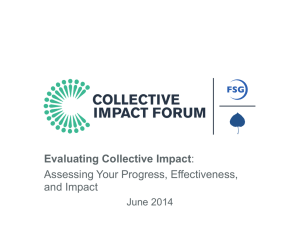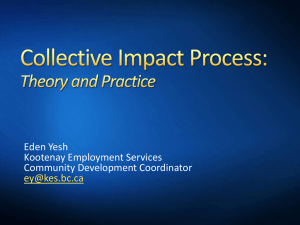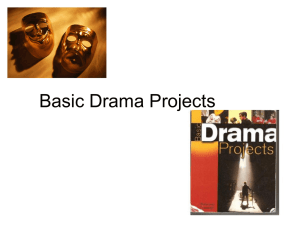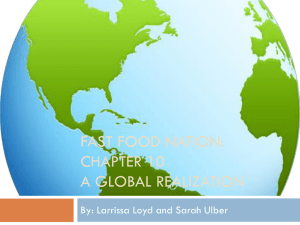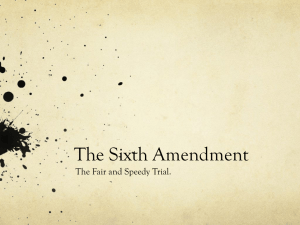Warm-up exercise - Collective Impact Forum
advertisement
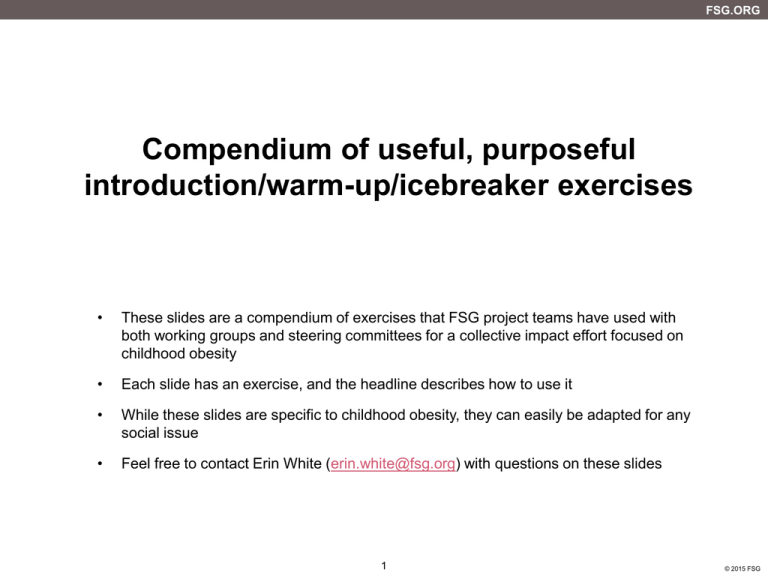
FSG.ORG Compendium of useful, purposeful introduction/warm-up/icebreaker exercises • These slides are a compendium of exercises that FSG project teams have used with both working groups and steering committees for a collective impact effort focused on childhood obesity • Each slide has an exercise, and the headline describes how to use it • While these slides are specific to childhood obesity, they can easily be adapted for any social issue • Feel free to contact Erin White (erin.white@fsg.org) with questions on these slides 1 © 2015 FSG FSG.ORG Introductions: for the first-time meeting of a new group 1. Name, Title, Organization 2. What does your organization do? (Explain as if to someone you just met sitting next to you on a plane). 3. How does your work touch childhood obesity? 2 © 2015 FSG FSG.ORG Introductions: for the first-time meeting of a new group Exercise Instructions: Why is childhood obesity important to you? • Find a partner. If you have previously been involved in this collective impact initiative, please find someone who is new today • Discuss the question with your partner. Be sure to note your partner’s responses • Introduce you partner to the group. In one minute or less, introduce your partner to the group and explain why childhood obesity is important to him or her 3 3 © 2015 FSG FSG.ORG Introductions: Getting people to “go deep” in knowing each other • Find a partner you don’t know well. Ask, • What do you do? • Why is it important to you? • Hmmm, why is that important to you? • Keep asking, “Why is that important to you? why…” until you make a discovery about the fundamental purpose behind why your partner’s work is important. 4 © 2015 FSG FSG.ORG Warm-up exercise: helping stakeholder see where they fit within the broad issue being addressed by the initiative • Write the name of your organization in BIG LETTERS on a sheet of paper in front of you, like this: MY ORGANIZATION If you work for multiple organizations, choose one. If you work for yourself, choose the organization with which you are most closely affiliated • Consider the various ways your organization touches the childhood obesity issue, and whether your organization’s influence is more focused on healthy eating, physical activity, or both • Line up across the front of the room on a spectrum relative to others based on your organization’s influence Physical Activity Equally influencing both 5 Healthy Eating © 2015 FSG FSG.ORG Warm-up exercise: for early meetings with a new group Tell me about a time when you felt particularly proud of the impact you made on health care quality through your work Instructions 1. Find a partner who you don’t already know 2. Discuss the question with a partner. Be sure to note your partner’s response. (~ 4 min) 3. Share your partner’s story with the group (~ 1 min each) 6 © 2015 FSG FSG.ORG Warm-up exercise: for early meetings with a new group AND to combat the “this is too hard for us to work on” mentality • Find a partner you do not know well. • Tell a story about a time when you worked on challenge with others and you are proud of what you accomplished. • What is the story and what made the success possible? 7 © 2015 FSG FSG.ORG Warm-up exercise: Using a site visit as a way to connect as a group and with the work Family Clinic Tour • For those of you who participated in the tour, what reflections or reactions did you have? • What did you see/hear that makes you think about our work? 8 © 2015 FSG FSG.ORG Warm-up exercise: to use after months of a group meeting OR if the group has already been meeting for awhile 1. Think of a time in the development of the collective impact initiative that you remember feeling excited, inspired, and very proud of what was happening. » » » » What was the situation? Who was there? What was your role? What was the core factor that made this experience possible and so meaningful? 2. Tell your partner a story about this experience. 3. Report out to the group on what you heard and how we might use that experience guide our future work together. 9 9 © 2015 FSG FSG.ORG Warm-up exercise: Using homework reading Separate into two groups 1. What did you read? 2. What did you learn from the reading? What was most surprising? • Robert Wood Johnson Foundation Research & Publications: http://www.rwjf.org/en/about-rwjf/program-areas/childhood-obesity.html • White House Task Force on Childhood Obesity Report: http://www.letsmove.gov/white-house-task-force-childhood-obesity-reportpresident 10 10 © 2015 FSG FSG.ORG Warm-up exercise: emphasizes importance of relationships in CI AND gets people focused on connection between day jobs and CI What connections emerged during or after our last meeting? • Did you: – – – Meet someone you’ve been meaning to meet? Have a “spark” connection? Identify an opportunity to work with someone new? 11 11 © 2015 FSG FSG.ORG Anytime exercise: to make connections between day jobs and the CI effort AND to help people see value in coming to meetings Two-Minute Drill • Approach: Individual participants share something top of mind for them— either something they’re excited about, or struggling with, or a new update about the work • Purpose: Learn from one another and make connections that might not happen otherwise, by putting rigor and structure around those connections • Benefits: Helps to reinforce heightened level of vigilance that enables participants to collectively see and respond to opportunities that would otherwise have been missed 12 © 2015 FSG FSG.ORG Warm-up exercise: to focus or re-focus on systems level Collective Impact Initiative Healthy Eating Working Group Icebreaker (25 minutes) 1. Before the meeting, mark four stations around the room (flip chart paper). Label the stations “individual,” “social,” “food environments,” “food marketing and labeling” and “policy.” 2. Divide the group into 3 small groups. 3. 3 min: The facilitator will lay the foundation for the icebreaker and explain the activity. 4. 5min: While in small groups, have each person start by sharing what they ate yesterday and why they chose those foods (key influencers)? 5. 12min: Have each small group discuss which of the influences (stations) they think has the greatest effect on what we eat. They must ultimately select one influence as having the greatest effect. If you wanted to change peoples’ eating behavior, on which influence would you target your intervention? 6. 2min: Each group will take turns standing by the station (flip chart paper) that most reflects their opinions. Ask one volunteer from each group to explain their responses. 7. Recap and link to overall strategies/goals of WG Station #1 Individual Station #2 Social Station #3 Food environments Hunger Taste Income Knowledge Emotions Health conditions Eating behaviors of: - Friends - Family - Coworkers - peers Cost and Availability of foods in: - Homes - Schools - Restaurants - Stores - Communities Values: - nutrition - convenience - environment - public health - Social justice - animal welfare Access: - public transit - sidewalks 13 Station #4 Food marketing and labeling Advertisements: - billboards - television - internet - magazines - newspapers Station #5 Food & agricultural policy food and nutrition assistance Labels: - nutrition - organic - fair trade Regulations on marketing Farm subsidies Support for organic © 2015 FSG FSG.ORG Warm-up exercise: to re-focus on process of CI / OR get a sense of folks’ understanding of CI and excitement about process • What makes this meeting different from others you attend? • Write down 1-2 ideas you have in mind (2 mins) • We’ll discuss our reflections as a group (5 mins) 14 © 2015 FSG FSG.ORG Warm-up exercise: connecting strategies to group members’ own experiences Form pairs and share a time when you’ve participated in physical activity as a part of a group or social network – what was the benefit of this experience? We’ll ask for 3-4 volunteers to share their partner’s story 15 © 2015 FSG FSG.ORG Warm-up: when the community gets bad press for the issue that is the focus of the CI effort • [City X] was recently in the news for having poor outcomes on the issue we care about: [insert link to article] • Spend 5 minutes reading the article • In groups of 2-3 discuss your impression of the article (10 minutes) – In what ways were the statements about our city not true? – In what ways were these statements generalizations or more “myths”? – In your opinion, what needs to be done to dispel the myths and highlight the truths about our city? 16 © 2015 FSG
